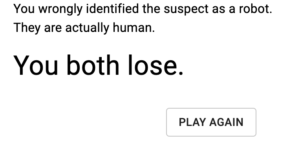
Inhuman Conditions, by Tommy Maranges, Cody O’Brien and Mackenzie Schubert
Platform: Web-app
Target Audience: People who enjoy roleplaying, and want a bite-size 2 player experience
Formal Elements
Players: 2
Rules: Follow the prompts on the screen. Generally, the interrogator is in the role of asking questions while the suspect answers.
Procedures: Mode of interaction in-game is buttons, with prompts, a la an online quiz. We also video chatted, but a phone call or in-person conversation also works.
Objectives: Determine the humanity, or lack thereof, of the suspect. As the suspect, convince the interrogator of your humanity.
Conflict: The interrogator wants to reveal the truth, the suspect wants to convince them they’re human. We never actually had the suspect be a robot, and in the case where they’re a human it’s effectively a shared objective with friction.
Outcome: Ultimately, the suspect is either correctly identified or not, and in the case where they’re human it’s a shared success or failure.
Resources: The primary resource is time – there’s a 5 minute timer for the interview.
Impactful Elements
The primary type of fun here is narrative. You’re telling and listening to stories, and trying to embody the role that you’ve taken on (my opponent got ‘The Butcher’ and chose a very dark interpretation thereof. I don’t think it occurred to him that it could just be a regular job). There is a secondary layer of fellowship – you’re telling each other stories, and listening to them – but I think narrative is the primary piece.
I think the first layer – the actual storytelling – was immediately fun, and worked from the beginning. The second part, taking on the role of interviewee and suspect, took a little longer to get used to – we didn’t immediately lean into them. However, once we did it was great – I think with experience, and if people lean into them, they work very well. That said, I could certainly see people who aren’t bought into the idea of the game.
![]()
It did strike a pretty good balance of giving prompts – see above for my favorite – which, combined with the backgrounds, ended up being a pretty good seed for interesting stories.
There were also additions to try and really place the players into the roles of interviewee and suspect. The quiz in the beginning, which gives the suspect the choice of background or one assigned to them, was just evocative enough of the interrogation scenes in Bladerunner to suggest a larger context for our roles.
Similarly, the choice to have ‘Suspect is a robot’ be available throughout the interrogation, whereas human is greyed out, also makes it a more compelling choice – although both times our suspect was a human, we misidentified it the first time because that button was just staring at me the whole time (and my partner’s ‘butcher’ answers were kind of psychotic, to be fair). It adds some additional tension, which helps distinguish this from a game were it’s simply cooperative storytelling. That said, it doesn’t seem to be entirely about conflict.

The final result of misidentifying a human as a robot was a mutual failure, which I found really interesting. It turned establishing humanity as a shared project – i.e., the onus isn’t just on the speaker or the interrogator. Perhaps this is reading a lot into it, but I think that this is a valuable commentary on the places in the real world where people are made to establish, or prove, their humanity – i.e., border crossings, crises, etc. It helped take it out of sci-fi and into the real world for me, and was much more affecting than I thought a game of silly prompts would end up being. The creator’s other game I’ve played, Secret Hitler, certainly never did that.
Comparison
It’s also a type of cooperation that I think is very rare in games. Fully cooperative games like Pandemic make it clear from the first moment that everyone is working together, and wins and loses together. ‘Coopetition’ games, where there’s a shared goal but separate metrics to track individual progress, make it clear initially that the players are in conflict to some degree. Here, however, they set up the players as in conflict but hide the fact that they have a mutual goal to achieve. To me, this is a lot more interesting that coopetition – the conflict feels a lot more natural, and the fact that it naturally follows from the core mechanics and conceit of the game itself, rather than a scoring layer or similar, is a rare thing.
It also sits at an interesting intersection between party/social games and roleplaying games. Although there are arguably elements of roleplaying in games like Charades, or social deduction games where you have to argue your case, it doesn’t tend to take the form of full-on storytelling. Meanwhile, roleplaying games tend to have more involved rules, and longer-form storytelling.
Moments
The challenge of using a 5 syllable word was great, but in large part because we totally misunderstood how it worked. Looking back at the rules, I think it’s supposed to be a one-time thing at the beginning. We thought that the suspect had to work one into every story. As I was listening to my friend’s story I’d hear him start using a really long word, and then start counting in his head, get to a number less than 5, and grimace. It became kind of a running joke and actually added a lot. I think the fact that it added a pretty substantial mental burden that kept coming up meant that it was pretty additive.

I’m not sure if it would actually be a good change to change the rules to match our misunderstanding though – in the second game, we just got ‘swear 3 times’, which I think could dictate the tone of the suspect’s answers too much, and end up making it feel more one-note.
Aside from that, I think the best moments came from the really absurd stories that came up – my friend’s description of hansel and gretel trails of dog treats to attract ‘good dogs’ was a particular highlight.
Things I would change
For me, although I enjoyed the game, I wish that it left more room for just talking. I prefer social games where you aren’t fully focused on the game, and are able to chat. I think a version where the stories have to be based on your own life, or an assortment of experiences you’ve had, could help get closer to this. I think the prompts cloud still work here, although it definitely could take away from the ‘are they a robot’ conceit, given all the prompts are actual events that happened to actual humans.
I did still like the game as-is, and I’m not sure my change would improve it as a game, but I think it would make me more likely to return to play it again.
In terms of actual improvements, I’d suggest a few other changes. For example, as far as I can tell the quiz in the beginning, with ordered letters, that determines the role selection, is the same every time. I think it would be more compelling if it changed – even after just one play-through it started to lose some of its appeal as set dressing, and I wanted it to be something more substantial. I think it would be pretty easy to do in the digital or physical version, and would help keep the beginning of the game more interesting.
I would also trim the pool of ‘penalties’. As mentioned above, some of the penalties – like swear 3 times – just weren’t that interesting. I think what distinguishes it from, i.e., the 5 syllable word one, is that it doesn’t actually add much mental load to the person trying to respond. Instead, it just fits as a kind of standard response, and just isn’t that interesting. I think that it demands less imagination from the interviewee than other prompts – it reminds me of some of the Cards Against Humanity choices where there’s a response that’s sort of de-facto funny, but doesn’t demand anything from the person choosing it. I.e., it isn’t that they made a funny connection, it’s just that they chose a card that the game’s creators made which has a funny word on it. To me, this felt like that, and was just less interesting than the other prompts.
Given I’ve only played twice, I don’t know how widespread that is, but I think that it would be a worthwhile change. I think prompts which give you less work to do could be a good fit in a game where people don’t want to think or invent as much, but I don’t think that describes the likely audience for this game, where people are signing up for 5 minutes of impromptu roleplaying.



